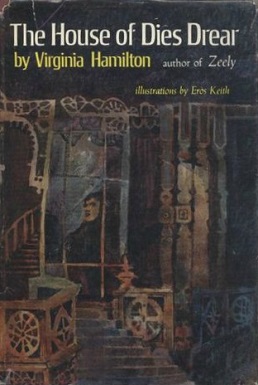The House of Dies Drear facts for kids

First edition
|
|
| Author | Virginia Hamilton |
|---|---|
| Illustrator | Eros Keith |
| Country | United States |
| Language | English |
| Series | Dies Drear |
| Genre | Children's mystery fiction |
| Publisher | Macmillan Publishers |
|
Publication date
|
1968 |
| Media type | Print (hardcover & paperback) |
| Pages | 279 pp |
| Awards | Edgar Award |
| LC Class | PZ7.H1828 Ho |
| Followed by | The Mystery of Drear House |
The House of Dies Drear is an exciting mystery novel for young readers by Virginia Hamilton. It was first published in 1968. The story is full of secrets and strange events in a house that many people believe is haunted. This book won the 1969 Edgar Award for Best Juvenile Mystery, which is a big award for mystery stories. It's the first book in a series called the Dies Drear Chronicles. The second book is The Mystery of Drear House.
The Story of Dies Drear House
The story takes place in Ohio in 1968. It follows a 13-year-old boy named Thomas Small. Thomas and his family have just moved from North Carolina to a very old, historic house in Ohio.
A House Full of Secrets
Thomas's father is a history professor. He has rented the house that once belonged to a man named Dies Drear. Dies Drear was an abolitionist. This means he was someone who worked to end slavery in the United States. The house had been empty for many years before the Smalls moved in.
The house is famous for having many hidden passageways. These secret tunnels were used to hide enslaved people who were escaping to freedom. This secret network was known as the Underground Railroad.
Mysteries and Ghosts
An old caretaker named Mr. Pluto lives on the property. He lives in a cave that he has made into his home. There are many rumors about the house. Some people say it is haunted by the ghosts of two enslaved people who were caught and killed there. They also say the ghost of Dies Drear himself haunts the house.
As Thomas and his family settle in, they discover many strange things. The house seems to have a life of its own. Mr. Small and Mr. Pluto work together to explore the house's secrets. They find many old and important items hidden away. These items tell stories of the past. They decide to keep these discoveries a secret for a while.
Thomas is excited to start a new school and make new friends. He hopes to learn more about the mysteries of the old house.
Television Show
The House of Dies Drear was made into a television movie in 1984. It was directed by Allan A. Goldstein.
 | Delilah Pierce |
 | Gordon Parks |
 | Augusta Savage |
 | Charles Ethan Porter |

